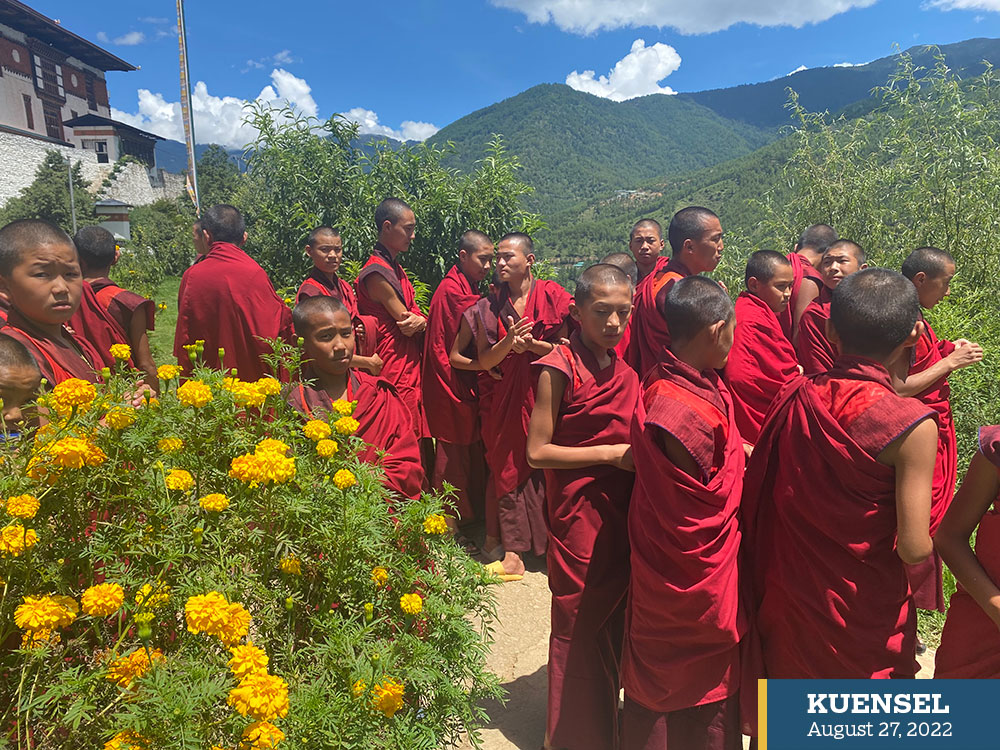Dechen Dolkar
Kinley, 44, was enrolled in the Dechenphodrang monastic school in Thimphu.
Then 11, Kinley remembers his mother telling him that here he will not have to toil. “Here you will get to eat well. When you grow up, you will have become someone very respectable.”
Soon little Kinley regretted the decision to join the school. It was the strict discipline and constant beatings he feared the most and often ran away from the school. One day made it for good; never returned to the monastery.
Looking back on those days, he said, “Punishments were unbearable.” He still has marks on his head and back to show.
Much has changed now in monastic schools. Corporal punishment, a form of violence against children, is banned in monastic institutions.
“It is a very safe environment today. Monastic schools have better facilities, even games,” said Kinley.
Dratshang Lhentshog today has a childcare and protection office. The office was established in 2009 with the support of UNICEF, Bhutan
Monasteries today have in fact become safe sanctuaries for orphans.
Changes
The officer, Jigme Tshewang of Dratshang Lhentshog’s child protection care office said that in 2013, His Holiness The Je Khenpo issued an order which stated that corporal punishment should be done away with immediately.
He said that the office continues to create awareness in monasteries to stop violence against the children and has also trained teachers.
“The violence has decreased drastically over the years. We have not had any case so far,” he said.
The child protection care office also has a shelter.
There are around 13,000 monks in the country; around 7,000 are below 18 years.
The office recently conducted a survey and found out that most monks suffer from mental health issues.
“This is because discrimination among the monks is still very common,” he said. “We are putting in place measures to address this issue.”
The information and communication officer of Zhung Dratshang, Thukten Jamtsho, said that monasteries provide nutritious meals to the monks. Special arrangements are made for monks who require specific meals for health and other reasons.
“This is a remarkable change which would have been unimaginable just a few years ago,” said Thukten Jamtsho.
Monasteries today have television for entertainment and sports grounds and equipment. Monks are also taught saving culture. Small monks have a piggy bank each.
Monastic schools today have English curriculum included besides traditional lessons in reading and writing. English is a key subject in all monastic schools. Failure to clear English exams will hamper monks’ promotion to the next grade.
“This is because if a monk wants to drop out and join a regular school, the transition will be easy for them,” Thukten Jamtsho said.
The Principal of Dechenphodrang monastery school, Tshewang, said that class duration has also been reduced to ease mental stress on the monks.
“From 12pm to 1.30pm, monks are given free time. They can do whatever they want to do in that time, like taking naps or washing their clothes,” Tshewang said. In the evenings, the monks can enjoy playing sports.
Pema Wangchuk, a 19-year-old monk of Dechenphodrang monastery, said that he joined monkhood at the age of 8 years old. Those days teachers and seniors used to beat the younger monks.
“Times have changed. There is no beating anymore. If we make mistakes, teachers correct us with advice,” Pema Wangchuk said.
The change, Jigme Tshewang said, has helped monks do well in studies.


